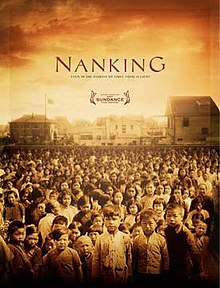Nanking (2007 film)
| Nanking | |
|---|---|

Nanking film poster
|
|
| Directed by |
Bill Guttentag Dan Sturman |
| Produced by |
Ted Leonsis Bill Guttentag Michael Jacobs |
| Written by |
Rosalind Chao Stephen Dorff John Getz Woody Harrelson Mariel Hemingway Michelle Krusiec Jürgen Prochnow Sonny Saito Graham Sibley Robert Wu |
| Music by | Philip Marshall |
| Cinematography | Stephen Kazmierski Buddy Squires |
| Edited by | Hibah Sherif Frisina Charlton McMillan Michael Schweitzer |
| Distributed by |
Fortissimo Films (world) THINKFilm (U.S.) CCTV (China) |
|
Release date
|
2007 |
|
Running time
|
88 minutes |
| Country | United States |
| Language |
English Mandarin (Nanjing dialect) Japanese |
Nanking (Chinese: 南京) is a 2007 film about the 1937 Nanking Massacre committed by the Japanese army in the former capital city Nanjing, China. It was inspired by Iris Chang's The Rape of Nanking, which discussed the persecution and murder of the Chinese by the Imperial Japanese Army in the then-capital of Nanjing during the Second Sino-Japanese War. The film draws on letters and diaries from the era as well as archive footage and interviews with surviving victims and perpetrators of the massacre. Contemporary actors play the roles of the Western missionaries, professors, and businessmen who formed the Nanking Safety Zone to protect the city's civilians from Japanese forces. Particular attention is paid to Nazi Party member John Rabe, a German businessman who organized the Nanking Safety Zone, Robert O. Wilson, a surgeon who remained in Nanking to care for legions of victims, and Minnie Vautrin, a missionary educator who rendered aid to thousands of Nanking's women.
The film uses the older romanization of the city's name, "Nanking", for its title. The standard modern romanization in mainland China, Hanyu Pinyin, renders the city's name as "Nanjing" (pronounced, with tones, as Nánjīng).
In the winter of 1937, the Japanese army occupied Nanking and killed over 300,000 and raped tens of thousands of Chinese people, one of human history's worst atrocities. In order to protect Chinese civilians, a small group of European and American expatriates, Western missionaries, professors, and businessmen banded together to save 250,000, risking their own lives.
...
Wikipedia
